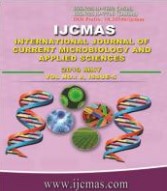


 National Academy of Agricultural Sciences (NAAS)
National Academy of Agricultural Sciences (NAAS)

|
PRINT ISSN : 2319-7692
Online ISSN : 2319-7706 Issues : 12 per year Publisher : Excellent Publishers Email : editorijcmas@gmail.com / submit@ijcmas.com Editor-in-chief: Dr.M.Prakash Index Copernicus ICV 2018: 95.39 NAAS RATING 2020: 5.38 |
As infection with Pasteurella multocida is common in cattle and buffalo, a monoclonal antibody based sandwich ELISA kit was developed for its rapid and easy detection. The test was optimized and standardized so that maximum concordance could be maintained with the standard procedures of hemorrhagic septicemia diagnosis recommended by the WHO expert committee. HS-1, a Pasteurella multocida type B specific monoclonal antibody developed in mice was used as tracing antibody to capture P. multocida serotype B:2 in a sandwich ELISA. The test was standardized for whole killed bacterial cell, sonicated and the LPS antigens of P. multocida type B:2. An anti-pasteurella hyper immune serum raised in rabbit acted as the coating antibody was selected since it was previously shown to be a major immunogen during P. multocida infection in rabbits and contain antibodies against several conserved epitopes. The sensitivity of the sandwich ELISA determined with ELISA well module (8x2) for whole killed bacterial cells, and with two fold serial dilutions of an antigen (12 steps and in triplicate) for sonicated and LPS antigen, were 1.6X1011 cfu/ml, 385 ng/ml and 17.4 mg/ml respectively. Specificity, evaluated against the cultured P. multocida type A antigen of bovine strain, was 100%. The coefficient of variation for sonicated and the LPS antigens calculated from intra and inter plate for same-day and inter-day tests were found within 20% indicating good reproducibility with few exceptions when CV varied more than 20%. In some instances, CV values as high as 23% and 25% were recorded for whole killed bacterial cell. CV values up to 25% indicated repeatability of the ELISA and higher OD values for whole killed bacterial cells did not record high standard deviations (SD). Therefore, the ELISA showed repeatability of the test for all three types of antigens. Furthermore, more expression of the P. multocida type B:2 specific PCR in comparison to P. multocida type B and P. multocida PCR in early phase of pathogenesis of the disease was detected and showed the greater analytical sensitivity and specificity to identify bovines infected with P. multocida. The results showed that this sandwich ELISA, with good specificity, sensitivity and simplicity, would be a useful assay for an early clinical diagnosis of HS. The ELISA can be performed directly on infected blood in modestly equipped laboratory, manned by semi skilled personnel.
 |
 |
 |
 |
 |